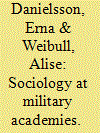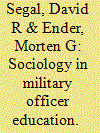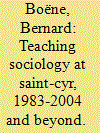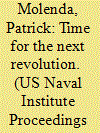| Srl | Item |
| 1 |
ID:
165044


|
|
|
|
|
| Summary/Abstract |
After the end of the Cold War, many European countries cut back so heavily on defense expenditure that they lost their capacity to defend themselves. This resulted in greater need for improved cooperation and interoperability among member states’ armed forces. One important attempt to improve the understanding and interoperability among the European Union (EU) nation’s armed forces was taken in 2008 by the creation of the European Initiative for exchange of young officers aimed to make the officer education in Europe more transparent and convergent with each other. This article presents a proposal for a generic pedagogic model for an academically professional officer education that can improve understanding and interoperability among the EU nation’s armed forces. The model helps to facilitate a process of professionalization of the military profession with an officer education that can meet the requirements of higher education systems as well as the demands of the military profession.
|
|
|
|
|
|
|
|
|
|
|
|
|
|
|
|
| 2 |
ID:
193786


|
|
|
| 3 |
ID:
083736


|
|
|
|
|
| Publication |
2008.
|
| Summary/Abstract |
This article illustrates the role of sociology at the Swedish military academies. Finding a suitable balance between theoretical and practical education seems to have been a major thread in Swedish officer education from the eighteenth century to the present day. The emphasis has been on education that is closely linked to military war positions, with extensive elements of combat planning and carrying out military operations. But as tasks have changed, areas such as leadership and organizations have become more important, and the positions of sociological theories and perspective have gradually increased. The belief put forward here is that the demand for sociology will increase for two reasons: the current struggle to make Swedish officer education more university-like and, more important, the need for sociological knowledge that will grow the more the Defense Forces will be engaged in the international arena.
|
|
|
|
|
|
|
|
|
|
|
|
|
|
|
|
| 4 |
ID:
083731


|
|
|
|
|
| Publication |
2008.
|
| Summary/Abstract |
This essay introduces a special issue of Armed Forces & Society examining sociology at military academies around the globe. Articles represent nine countries-Canada, France, Japan, the Netherlands, Russia, South Africa, Sweden, Turkey, the United States. We begin with a brief history of sociology and the military and growth of military sociology as a subfield, followed by the development of military academies in general and sociology at military academies more specifically. The essay concludes with six trends found across the nine nations and ten academies-the stigma of sociology; the cannibalization of sociology courses; co-optation of sociological concepts; charismatic leadership; radical social change; and revitalization.
|
|
|
|
|
|
|
|
|
|
|
|
|
|
|
|
| 5 |
ID:
083735


|
|
|
|
|
| Publication |
2008.
|
| Summary/Abstract |
Despite its content being perceived as highly relevant to Canadian Forces (CF) leader development and current and future role demands, sociology has not become permanently embedded in the Canadian military college (milcol) curriculum. We argue that among other factors, this has been the result of such influences as lack of interest and/or support from academic sociologists outside the military; hegemony of other disciplines within the military; reaction of the military system to sociological topics and results; the number and organization of uniformed and civilian sociologists internally; and the failure of military sociologists to adequately market themselves or to follow up on the gains they have made. Notwithstanding, the authors note that recent developments both outside and inside the military college environment offer some promise of improved prospects for sociology (and anthropology): preferably, within a more multidisciplinary instructional context
|
|
|
|
|
|
|
|
|
|
|
|
|
|
|
|
| 6 |
ID:
083732


|
|
|
|
|
| Publication |
2008.
|
| Summary/Abstract |
This article recounts the course of sociology as a teaching subject at the French military academy from the personal perspective of one of its local protagonists. Having placed its introduction in context, it points up the motives behind a reform of studies (1982) which gave academic education greater scope and in which sociology played a central part. It goes through the various stages in the institution-building process that led from initially mixed reception to full internal acceptance as part of a common core of subjects. It analyzes the reasons for another major reconsideration, in 2000, of curricula and avenues of access, which endorsed and radicalized the previous reform's philosophy and turned sociology into a truly pivotal discipline-one that allows better integration of the academic and military sides of officer education. It assesses, in conclusion, the factors behind such a (fragile) success story
|
|
|
|
|
|
|
|
|
|
|
|
|
|
|
|
| 7 |
ID:
132591


|
|
|
|
|
| Publication |
2014.
|
| Summary/Abstract |
Recent events, both in our nation's capital and across the globe, indicate that the Navy Faces an increasingly constrained financial environment and an uncertain international landscape characterized by both risk and opportunity. To set a course through an emerging era of maritime-centric security challenges, the Navy will require talented officers and future leaders who possess solid intellectual and critical thinking foundations coupled with a host of practical skills. Unfortunately, Navy shortfalls regarding advanced education are well documented, with many critics asserting that the service does not value higher learning.
|
|
|
|
|
|
|
|
|
|
|
|
|
|
|
|